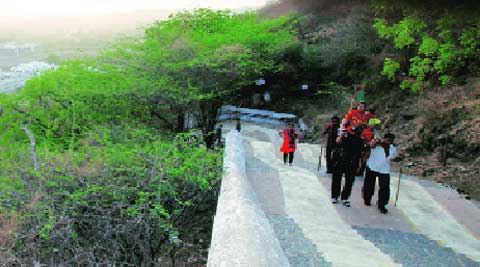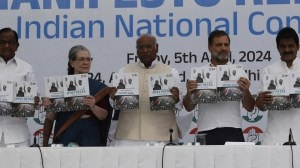- India
- International
A town that would shun non-vegetarian food
A movement by Jain monks assures that Palitana will be declared a vegetarian town.
 On the steps, Jain pilgrims, with the sling chairs usually handled by Muslim carriers. ( Source: Express photo by Javed Raj )
On the steps, Jain pilgrims, with the sling chairs usually handled by Muslim carriers. ( Source: Express photo by Javed Raj )
Rafiq Derival, 64, waits for passengers with his horse buggy parked near Chella Chakla in Taleti, the foothills of Shetrunjaya Hills, one of the holiest of pilgrimage places for Jains and overlooking Palitana town in Gujarat’s Bhavnagar. Palitana is the town that a group of Jain monks wants declared vegetarian-only, with a fast-unto-death by 200-odd monks last week leading to an assurance by minister Tarachand Chheda that the government will look into the demand.
Ask “Rafiq Chacha” about the fast and he says, “India is a free country. Anyone is free to follow the faith of his choice.” He notes, however, that at least 60 per cent of Palitana residents are non-vegetarian. Municipality officials say that of the 65,000 population of the town, 17,000 are Muslims, while the Jains add up to 5,000. Many non-Muslims too are non-vegetarian.
The movement
Jain monks, led by Virag Sagar Maharaj of Jambu Dwip, a subgroup of the Shwetambar sect, had submitted a memorandum to the subdivisional magistrate demanding that the town be declared vegetarian-only. A week later, on June 22, they began fasting with the demand that Palitana be made a hinsa-mukt (violence-free) town by prohibiting sale, storage or transportation of non-vegetarian food.
Moves in that direction, in fact, predate the agitation. In 1999, the district magistrate issued a notification, the subject of a continuing court debate, declaring the 2.5-km Taleti Road that leads to the hills, and up to 250 m on either side, an exclusive vegetarian zone since the hills are an “extremely holy pilgrim place of Jainism”.

Issued under section 33(1)(m) of the Bombay Police Act, 1951, the notification led to five non-vegetarian restaurants converting to vegetarian. Some Muslim hoteliers appealed in the Gujarat High Court, which struck down the notification. The government issued a fresh notification under Section 33(1)(w)(2), and the hoteliers again moved the court, where the matter is pending.
In 2012, the municipality’s general board adopted a draft resolution extending the notification to the entire town, and invited objections and suggestions from residents. “We have received 1,870 objections. They have been heard and the municipality’s general board is likely to take up the matter at its next meeting,” says Babu Baral, chief officer of the municipality.
If the board clears the resolution, it will be forwarded to district magistrate, who in turn will send it to the state urban development department. DM Pravin Solanki said the government will not rush into a decision. “The municipality will look into all aspects before taking a final call. We shall check its legality and ensure that freedom of citizens is not compromised,” says Solanki.
The non-vegetarians
Muslims met the subdivisional magistrate to protest against the monks’ campaign. “If we don’t offer qurbani (sacrifice), we will not remain Muslims,” says Razaq Ismail Saiyad, or “Bablubhai Lightwala”, the president of All Muslim Jaman of Palitana.
Among non-Muslim non-vegetarians is a 33-year-old railway official from Bihar now posted in Palitana. “I like eating chicken and eggs occasionally, but I ask somebody to go buy it for us,” he says. Asking that he not be named, he adds that religious feelings should not encroach on the freedom of others. “Prohibition in an area is okay but how advisable it is to impose it on an entire town?” he says.
His wife, mother of two girls, says she eats non-vegetarian food only when she visits her mother in Bihar. She has visited the foothills but says she had not known the religious importance of the town until the agitation.
Says the principal of an English-medium school, a Christian: “Since I came to Palitana a year ago, I have not had non-vegetarian food as I know the feelings associated with this place. My family and I enjoy meat when we travel to Rajkot or Bhavnagar.”
The businesspeople
“We held a meeting (about three months ago) with 68 persons in the business of non-vegetarian food (butchers) and offered to rehabilitate them with financial assistance,” says Virag Sagar Maharaj.
As part of the movement, called Palitana Jiv Raksha Abhiyan, monks have brought out a booklet listing the 68 butchers and pegging the “rehabilitation cost” at Rs 2 crore. “Jains spend around Rs 700 crore every year in Palitana. Is Rs 2 crore too big an amount to make the mission of making Palitana a violence-free city a success?” The maharaj says, “So far 13 persons have given notarised undertakings to shun their business and we have extended them financial help.”
Not everyone who accepted the offer is happy. “They committed Rs 9 lakh but we have received only Rs 4.5 lakh. They say they will give the rest by Diwali,” says Lakshmi Ukreja whose husband Bhagwanmal used to run a licensed non-vegetarian outlet on Taleti Road for 50 years. After the 1999 notification, he converted his outlet first into a vegetarian one and then into a footwear store.
Sources say those selling non-vegetarian food on handcarts were offered Rs 5 lakh. Palitana is said to have just four omelette handcarts and three meat shops, apart from an estimated 100 fish outlets.
“Palitana has always been peaceful but the maharaj is trying to disturb the peace,” says Gani Mehtar, who has been selling omelettes from an unregistered handcart for 30 years. He once parked it at the starting point of Taleti Road, then shifted after the notification. He says he is willing to negotiate with the monks if they raise the offer.
Says a 70-year-old woman, whose two sons sell chicken and eggs, “We are a family of 17 and this is our bread and butter. We can’t change our business overnight. And even then, we cannot stop offering qurbani.”
The vegetarians
Local Jains other than the monks seem aloof from the campaign. Says Shantilal Mehta of Visashree Jain Mahajan Trust, “We have extended moral support to the campaign but we are not directly involved in it. We cannot dictate terms to others in matters of religion. It can lead to dispute.”
There is, however, support from Jain pilgrims. “This is a religious place. If they want to continue their business, they could go to another place,” says Ranjit Jain, a trader from Mumbai.
Apr 25: Latest News
- 01
- 02
- 03
- 04
- 05








































